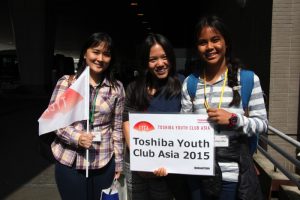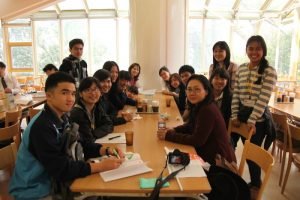For most of us Sunday is a welcome day of rest, a time for some down time, but for a group of high school students in countries across ASEAN it was a day for last minute preparation, packing, panicking, and getting ready to fly to Japan for Toshiba Youth Club Asia.
Toshiba Youth Club Asia (TYCA) is an eight-day program for high-school students from ASEAN and Japan. Its goals are simple: bring together a group of kids from different backgrounds and cultures; let them get to know one another; and encourage them to think about how to overcome the shared challenges they will face in the future.
This is the first year of the program, and it will run twice. In this first iteration, students from Laos, Viet Nam, Myanmar, Thailand, the Philippines and Cambodia this morning stepped off red-eye night flights from their respective countries into a warm Japanese spring day in Tokyo Later in the year, in December, the program will welcome students from Brunei, Indonesia, Malaysia, Singapore and Thailand.
Toshiba and Toshiba International Foundation (TIFO), the sponsor of TYCA, are no strangers to promoting educational programs. For 25 years now in the United States, Toshiba, with Toshiba America Foundation and the National Science Teachers Association, has sponsored ExploraVision, a science competition for students in kindergarten to twelfth grade, and now the biggest in the US. In China, Toshiba and the Education Ministry hold an annual competition that encourages student science and math teachers to improve their capabilities in lesson planning and in the classroom.
For the six years from 2008, TIFO sponsored Toshiba Youth Conference (TYC), an annual summer camp that brought together students from Japan, the US, Thailand and Poland. With camps in Japan and Thailand, TYC was a great success, and the predecessor of the two programs TIFO now runs with Toshiba. The first of these, Tomodachi, grew out of US-Japan cooperation following the March 2011 earthquake in Northeast Japan. It’s a week-long program for students from the US and Japan, and a great opportunity for a cross-cultural experience in the heart of Tokyo. The second program is TYCA.
The participants in TYCA are truly an international bunch. There are 16 student participant in all, four from Japan and two each from Cambodia, Laos, Myanmar, the Philippines, Thailand and Viet Nam, ranging in age from 15 to 18. They were selected in a competitive essay competition, and all are accompanied by advisers, who will act as chaperones and participate in the program. And quite a program it is.
From check-in today through to Monday next week, TYCA will keep the participants on their toes. Today was all about settling in and orientation and tomorrow is all about getting to know one another, looking at the problems facing each country, and forming four teams for the upcoming activities. Wednesday, March 25, is Environment & Development Day, Thursday is Technologies & Lifestyle Day, and Friday is Urbanization & Diversity Day. Saturday will allow the participants some welcome time to absorb the events, activities and information of the previous days, and to work on the group presentations they will make on Sunday.
Of course, the program is not all work. Alongside educational visits, the schedule includes a visit to the Yokohama Ramen Museum; a tour of Meiji Jingu, the shrine and urban forest in central Tokyo; a tour of the city; and a farewell party.
TYCA looks like it will be interesting, challenging, and a lot of fun and judging by some of their comments the student participants from ASEAN are really looking forward to it, for all sorts of reasons.
Sydney Mateo, a 15-year-old from the Philippines, catches the spirit of the program with a comment: “Of course, it goes without saying that this event will provide valuable opportunity to interact with the youth and gain new friends from across Asia.” Pimburabha Thamawuit, 16, from Thailand, also sees it as, “my new, eye-opening experience” and an opportunity to “experience that kind of Japanese way of life” and “a pleasure to exchange and demonstrate with other people about our way, the Thai’s way of communication and living.”
The students also have a good idea of the program’s educational goals. Hnin Thida Nwe, a 17-year-old from Myanmar, captures it clearly: “Programs like TYCA are a great help to widen youth’s knowledge and leadership skills. Education is a powerful weapon or a stepping stone for the future.” Vilakoun Boudphachanh, a 15-year-old from Laos, is also enthusiastic: “What I have learned in this program will broaden and benefit my critical thinking and problem solving skills to help me bring more knowledge and experience to my home country. Hoang Nhat Quang, 16, from Viet Nam agrees: “I really believe that the experience getting from this program will impact positively on my motivation of learning and ambition of what I can contribute to my country and to the world.”
The Japanese students are also looking forward to TYCA. Kokoro Osada, 15, sees “Asia is a continent, full of hope to lead the world in the future” and wants to build a strong partnership, while being aware that “the roles of Japan and Asia will continue to go through dramatic changes.” Sana Kobayashi, 17, believes that addressing today’s problems needs “close international cooperation more than anything else” and that “to talk and understand each other is the first step.” This week’s activities will offer a good start.
A good summation of TYCA, one we can surely all subscribe to, is offered by Eang Sokunthea from Cambodia: “By learning and acknowledging the difference we have, we can achieve mutual respect and it would help improve mutual understanding between each countries. It is very important because without mutual respect and mutual understanding, we could not strengthen our relationships between countries in the region and thus we could not contribute to building peace in the region we are living as well.”





